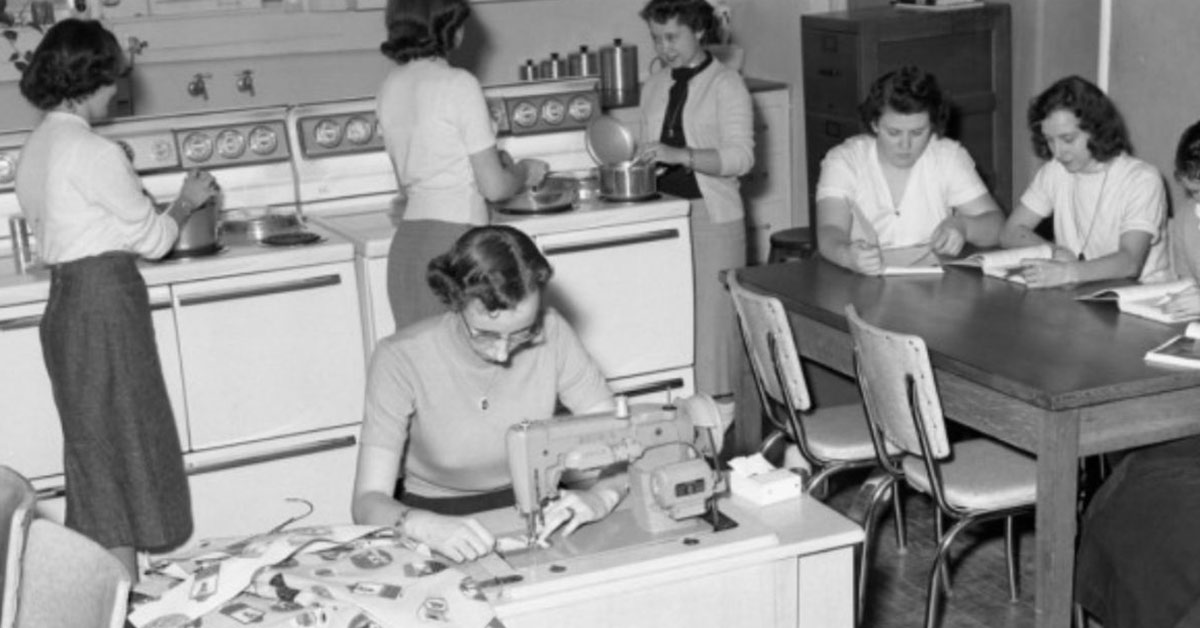What is home economics? Chances are you’ve heard of it – it’s that old school class they used to have all the girls in school take that taught them about taking care of a home and family, right?
During the 19th and 20th centuries, that assessment would pretty much check out. Home economics, or simply homemaking, was a foundational part of remedial education – especially for young women. But during the latter part of the 20th century and into the 21st century, home economics began to decline. Schools began to focus more on college prep, which resulted in home economics being sidelined. [1]
Educators see a need for home economics
Some educators see a need for basic life skills being taught in school. Marti Harvey, a lecturer at the University of Texas at Arlington, argued in a 2018 opinion piece for Dallas News that it’s high time we bring back home economics. [2]
“It’s a failing of our educational system that students don’t leave high school with this basic understanding, among other things,” Harvey wrote. “That’s why we need to bring back the old home economics class. Call it “Skills for Life” and make it mandatory in high schools. Teach basic economics along with budgeting, comparison shopping, basic cooking skills and time management. Give them a better start in real life than they get now.”
It sounds like a perfectly reasonable assessment, and it reflects the sentiments of some older Americans who marvel at how unskilled younger generations are. But does the data bear this out the same way anecdotal evidence does?
Are young people really helpless?
Let’s first examine one of the quintessential skills that all people should possess: changing a tire. We can probably all remember a time or two that we’ve been in a situation where a tire needs to be changed, but do you know how to do it?
According to a Cooper Tires survey, about 74% of Americans know how to change a flat tire. And despite the popular trope that young people don’t have the skills to change a flat, it was actually younger Americans who reported knowing how to change a flat more than older Americans. 78% of Gen Xers and 77% of Millennials reported knowing how to change a flat tire, as opposed to 71% of baby boomers and 67% of the silent generation. [3]
70% of Generation Z, whose age range is presently 8 to 23 years old, reported knowing how to change a flat.
So knowing how to change a flat is nearly ubiquitous, but what about cooking? Knowing how to cook was one of the central tenants of home economics. In the absence of home economics class, you would think that cooking would be in decline, but a study published in Biomed Central found the opposite – that the prevalence of cooking at home is on the rise. [4]
Read: School Teaches Girls How To Change Tires and Check Oil Levels as Part of New Initiative
Who’s doing the household stuff?
The study, published in 2018, found that between 2013 and 2016, the percentage of college-educated men who cooked rose from 37.9% to 51.9%. College-educated women also cook more often, increasing from 64.7% to 68.7% over the same time period.
Does this mean that we don’t really need home economics classes? Not everyone would agree. Tommy John, a company that manufactures men’s undergarments, surveyed 1,000 people about which household tasks they knew how to do by themselves. Their findings point to a society of people who largely lack basic household skills – at least without the help of Google. [5]
Tommy John found that one in three can’t do basic household tasks alone, men were 1.6 times as likely as women to lack essential skills, and that most would rather pay for laundry services than do it themselves.
According to their data, 56% knew how to iron a shirt, 47% knew how to remove clothing stains, 46% knew how to read laundry tag symbols, 45% could sew a button, and only 12% could tailor clothing.
Young people need help in the workplace
A home economics for the 21st century may need to do a lot more than teach people about managing their home lives. A survey of 3,000 firms conducted by the British Chambers of Commerce found that 90% of young people who have left school were not prepared for employment. They report the same for about half of college graduates. [6]
The chambers have called for work experience to be taught in secondary schools in the UK, helping students learn about being resilient, communicating well, and being part of a team. Many businesses expressed the view that, while younger employees are often needed, it’s a risky roll of the dice hiring one due to these shortcomings.
Home economics for the 21st century
There is a lot of data out there that points to younger generations being more skilled than older, and quite frankly, the opposite. What is clear is that the life skills needed by young people in the 21st century is substantially different from those of young people in the 19th century. If home economics is brought back, its syllabus should undergo a major facelift.
Keep Reading: School in Spain Teaches Boys How to Do Household Chores to Stop Gender Inequality
Sources
- “Is Home Economics Class Still Relevant?” Smithsonianmag.com. Jesse Rhodes. Accessed November 30, 2020.
- “Bring back home economics class because our kids lack basic life skills.” Dallas News. Marti Harvey. Accessed November 30, 2020.
- “Detailed Cooper Tires Survey Findings.” Cooper Tires. Accessed November 30, 2020.
- “Who’s cooking? Trends in US home food preparation by gender, education, and race/ethnicity from 2003 to 2016.” Biomed Center. Lindsey Smith Taillie. Accessed November 30, 2020.
- “Home Improvement: 32% of Americans Lack Basic Household Skills.” Tommy John. Accessed November 30, 2020.
- “Young people lack workplace skills, firms say in survey.” BBC News. Accessed November 30, 2020.

